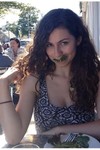МАДОННА (В ЦЕНТРЕ), ГАЙ РИЧИ (СЛЕВА) И БЫВШИЙ СОДИРЕКТОР ЦЕНТРА КАББАЛЫ ЙЕГУДА БЕРГ (СПРАВА). АВТОР ФОТО – САРА ДЖЕЙ/GETTY IMAGES
Before Cartier Love bracelets or Yeezys, there was a time you couldn't open an Us Weekly without seeing one covetable accessory: a red string Kabbalah bracelet. The religion was the celebrity spiritual moment du jour during the 2000s, and everyone from Madonna to Ashton Kutcher to Lindsay Lohan dabbled in the mystical religion. But in the decade since its heyday, the spiritual movement has all but faded from the forefront of popular culture, suffering major blows along the way."Kabbalah is an ancient wisdom that provides practical tools for creating joy and lasting fulfillment. It's an incredible system of technology that will completely change the way you look at your world," reads the website of the Kabbalah Centre, the organization that introduced many celebrities to the practice.Experts believe the Kabbalah Centre should be distinguished from Kabbalah itself. "There is no uniform way of studying Kabbalah in the traditional sense," says Elliot Wolfson, a Professor of Religious Studies at University of California, Santa Barbara focusing on Jewish Mysticism. "There are various texts that have achieved a canonical status, most importantly, the Zohar and the so-called Lurianic texts, but other Kabbalistic works are studied as well in traditional settings, such as the works of Moses Cordovero, Shalom Sharabi, or the Vilna Gaon."According to Wolfson, these mystical texts are more esoteric than the Torah and Talmud and explore supernatural aspects of Jewish spirituality, but are traditionally limited to men over 40 who have spent years studying Jewish scripture and are deemed ready to understand these larger mysteries (though Wolfson adds that this tradition is often broken).Although it takes some a lifetime to fully study and understand Kabbalah, Rabbi Philip Berg founded the Kabbalah Centre to make its teaching available to all. A former insurance salesman, Berg discovered the teachings of the Kabbalah on a trip to Israel and began teaching classes out of his insurance office with his second wife Karen, his former secretary. The Bergs hoped to make Kabbalah accessible to groups that were traditionally excluded from its study, such as non-Jews and women, but the center struggled for years.Read full story on Broadly.
Advertisement
